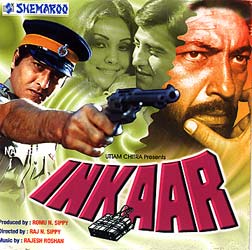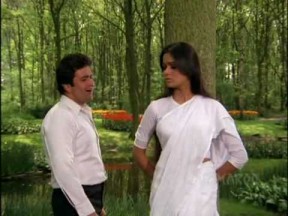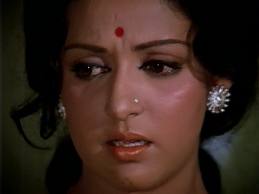The good thing about cheaper DVDs flooding the market is that one no longer has to think twice before picking up a film. My recent acquisitions include Raj Kapoor’s Prem Rog, Raj Sippy’s kidnapping caper Inkaar, Gulzar’s Khushboo and a few others just for a song. None of the above films are masterpieces from any angle. They just recreate another kind of filmmaking which is almost extinct today. Intimate, emotive and stamped with a certain directorial conviction for better or for worse.
Prem Rog is hugely flawed with its vulgar comedy track involving a middle aged groom and a teenaged bride, its rather ambiguous take on astrology and whether a widow who has beautiful hair will invite violation, the unbearably melodramatic portions where a young widow and her suitor are about to be burnt alive in public but it also has these staggeringly moving moments invested with Raj Kapoor’s belief in the all-transforming power of love. Moments that you watch, transfixed. Like that scene where Rishi Kapoor’s Dev wants the widowed Manu (Padmini Kolhapure) to have a meal with him at his home and she says, “Tum bahut zabardasti karne lage ho.” And he recalls her as she once was. A spirited, spunky young girl and says, “Tumne jo karni chhod di.” He has to be stubborn now because she has forgotten how to be wilful.
My favourite scene in the film and which for me is worth the price of my DVD, is where the patriarch Thakur of a Rajput family (An imperious Shammi Kapoor) offers his widowed niece to her lover Dev (Rishi Kapoor), not in marriage but for elopement. Marriage of a widow, he tells Dev, is not a possibility in a Rajput household but yes, if she elopes, she will be first cursed, berated and then forgotten. The haveli in which this conversation is taking place, is bathed in candle light because there is a power cut and Dev locks eyes with the old man and tells him, “Ye to dharmyuddh hai…issme samjhauta nahin hoga. Ya to poori tarah haar hogi ya poori tarah jeet.’’ Which when roughly translates means, “This is a war of faith…and it will be fought without compromises. Either I will win completely or lose completely.’’
And just then, a few dozen chandeliers burst into blazing glory overhead. Dev smiles and says, “Ab ijazat dijiye (I take your leave. Now.) and walks away. Rishi Kapoor was marvelously low-key in an otherwise overwrought film and in scene after scene he proved to you with gentle passion just how greatly under-rated an actor he really was. His unspoken farewell in the first half of the film to his childhood love during her wedding is a text-book moment for actors who for the life of them cannot convey tenderness without killing it with too little or too much emphasis.
Inkaar, ofcourse till date, retains its charm as a slick and intelligent account of a child’s kidnapping and his recovery by a team of CBI officers led by the charismatic Vinod Khanna. How the team traces the crime with the help of little clues like the stamp of a laundry on a piece of cloth recovered at the scene of crime made us all want to believe that the days of “Police ne tumhe chaaron taraf se gher liya hai,” were well and truly over in Hindi films.
Gulzar’s Khushboo had that rare quality. A mellow serenity, a sense of time far removed from the frenzied film-making of today. Khushboo was based on a Sarat Chandra story which inevitably meant that it was about a woman who nurtures a childhood passion for a man against all odds, loves him to the point of self-negation like Paro in Devdas and the wistful grief of the abandoned bride in Parineeta and yet has self-respect that won’t brook violation in any form.
This was one of Hema Malini’s best performances. She was able to convey so much introverted passion so convincingly in films like Khushboo, Palkon Ki Chaoon Mein and Meera because perhaps her own life ran parallel to the unrequited love in these stories. She was never really the only woman in the life of the man she gave up the world for and in films like these, you felt that pain coming right through. Her Kusum in Khushboo waits all her life for the man she was betrothed to as a child but she refuses to marry him when his mother conveys to her, more pity than affection. “I am not someone they can reject or accept at will,’’ she fumes.
When the man (a subdued Jeetendra) asks her in the end what is it that he lacks that she won’t accept him, she says, “Aap main adhikaar ki kami hai.”
“You lack something. It is the knowledge that you have as much right upon me as I have on you. Why don’t you break my stubbornness with your authority…why don’t you hold my hand and take me away?’’
Aah, the fragrance of nostalgia. Of slow burning love. There is nothing quite like it.
Reema Moudgil is the author of Perfect Eight (http://www.flipkart.com/b/books/perfect-eight-reema-moudgil-book-9380032870?affid=unboxedwri )








